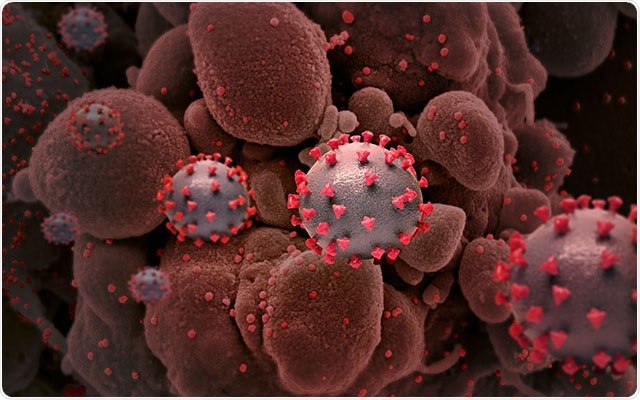For a long time, James McKerrow, MD, PhD, dean of the Skaggs School of Pharmacy and Pharmaceutical Sciences at University of California San Diego, has investigated neglected tropical diseases, which are chronic, disabling parasitic infections mainly affecting the poor and underserved communities in developing nations.

Creative rendition of SARS-CoV-2 particles (not to scale). Image credit: National Institute of Allergy and Infectious Diseases, NIH.
They are named “neglected” since there is not much financial incentive for pharmaceutical companies to develop therapies to treat them.
Chagas disease is one such neglected disease and a major cause of heart failure in Latin America. This disease is spread by “kissing bugs” that carry the parasite Trypanosoma cruzi. These parasites synthesize an enzyme known as cruzain that enables them to replicate and escape from the human immune system.
McKerrow’s research group has been seeking suppressors of cruzain, which are small molecules that could be the foundation for new anti-parasitic medicines. K777 is one specifically effective cruzain suppressor.
In the spring of 2020, the COVID-19 pandemic started to spread throughout the United States. Scientists quickly reported that SARS-CoV-2, the coronavirus responsible for causing COVID-19, cannot bind to and infect human cells without the cleaving of the spike protein of the virus by a human enzyme known as cathepsin L.
Coincidentally, cathepsin L appears and behaves quite similar to cruzain.
In a paper published in ACS Chemical Biology on March 31st, 2021, McKerrow and his colleagues have demonstrated that low concentrations of K777 suppress cathepsin L and can reduce SARS-CoV-2’s potential to infect four host cell lines, without damaging the cells.
Since K777 inhibits a human enzyme, not the virus itself, it’s our hope that it’s less likely the virus will evolve resistance against it,”
James McKerrow, Dean, Skaggs School of Pharmacy and Pharmaceutical Sciences, University of California San Diego
McKerrow is the co-senior author of the study along with Thomas Meek, PhD, from Texas A&M University.
K777 was not equally potent in all cell lines. This is possibly due to the fact that not all cell lines synthesized the same amount of cathepsin L or the same amount of ACE2—the host cell receptor used by the spike protein of the virus to bind to cells once it is cleaved by cathepsin L. The inhibitor was most potent at inhibiting SARS-CoV-2 infection in the cells that synthesized the highest amount of cathepsin L and ACE2.
The researchers extracted the tested cell lines from human cervical epithelium, African green monkey kidney epithelium, and two kinds of human lung epithelium. Although these cell lines are a crucial research tool, they are not essentially representative of patients.
They are simple to grow and control in research labs as they are cancer cells. However, that also implies their molecular features possibly vary from the healthy cervical or lung cells of an average person.
We were surprised at just how effective K777 is in blocking viral infection in the lab. Yet under usual circumstances it would be impractical and unlikely that we ourselves would be able to move the compound so quickly into clinical trials. We’re fortunate that an ‘entrepreneur-in-residence’ program here at UC San Diego has helped bridge that gap.”
James McKerrow, Dean, Skaggs School of Pharmacy and Pharmaceutical Sciences, University of California San Diego
K777 has been licensed from UC San Diego by Selva Therapeutics, a privately owned biotechnology company. Along with this study, the company has also discovered that the experimental therapeutic inhibited lung damage in COVID-19 animal models, and people who took part in a Phase I clinical trial to evaluate its safety exhibited good toleration.
Selva is looking to conduct a Phase IIa clinical trial in late 2021 for non-hospitalized COVID-19 patients.
Several people affected by COVID-19 experience mild disease and can recuperate at home with supportive care to help alleviate their symptoms. At present, severe COVID-19 cases may be treated using remdesivir, an antiviral drug approved by the U.S. Food and Drug Administration (FDA) for use in hospitalized patients, or a medication that has been authorized by the FDA for emergency use, for example, monoclonal antibodies.
Over 124 million people across the globe have been diagnosed with COVID-19, of which 2.72 million have died due to the infection.
Source:
Journal reference:
Mellott, D. M., et al. (2021) A Clinical-Stage Cysteine Protease Inhibitor blocks SARS-CoV-2 Infection of Human and Monkey Cells. ACS Chemical Biology. doi.org/10.1021/acschembio.0c00875.